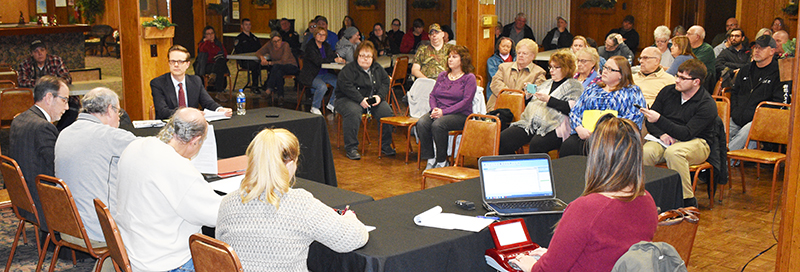
Approximately 75 persons attended the hearing on Wednesday night at the Latin American Club. The Zoning Hearing Board heard a proposal to put a new half-way house in Ford City. The audience was divided on the matter.
A two-hour hearing by the Ford City Zoning Hearing Board drew approximately 75 people in attendance on Wednesday night. The hearing was on an application by Firetree Ltd., a Williamsport, PA firm, that was seeking a Special Exemption under the zoning ordinance to establish a drug/alcohol half-way house at 500 3rd Avenue.
The facility would house a maximum of 30 men in a residential setting for periods not exceeding six months. Because the property is in a Business-1 zone, a Special Exception is necessary to allow the use to include a residential component.
Firetree Chief Counsel George Bishop testified that residents would be referred from treatment programs such as ARC Manor. The half-way house is a transitional program that helps persons become productive members of society again and keeps them from going back into a setting that would be harmful to their recovery.
Jennifer Atwood, who is in charge of a similar half-way house in Indiana, PA, testified that there have not been any disciplinary problems requiring police intervention and that residents are required to obtain employment within three weeks of coming into the half-way house as well as receiving daily counseling.
Despite the glowing reports from Bishop and Atwood, response from the audience was mixed. Some felt it was encouraging an negative element of addiction into the community. Others felt it would give positive assistance to those who otherwise would have no place to return from initial treatment.
A total of 15 individuals took the opportunity to give testimony or ask questions of Bishop.
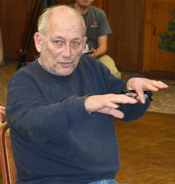
Greg Dinko
Resident Greg Dinko asked about building maintenance. Bishop responded that while residents would do the basic day-to-day cleaning, grass cutting and snow removal would be contracted out. Dinko then pointed out that Firetree was a non-profit organization and was concerned about the tax base.
“I pay taxes because my taxes also help me with fire prevention and police protection. You being non-profit are not going to be paying that money to the municipality. Is there any way that, in lieu of these taxes, that you could (make payments)?
Bishop answered, “I can say that we have arrangements like that at other locations, and actually at some of our locations, we do pay real estate taxes.”
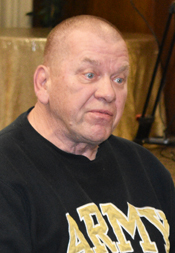
Ron Wojcik
Ron Wojcik was against having a half-way house in his community.
“I’ve lived in this town all my life except the time I spent in the service. I live in the 500 block of Fourth Avenue for over 40 years now. I do not want this facility on my block. We have enough problems in this town. We don’t need to import people.”
Bishop testified earlier that there was a parking lot adjacent to the building that would provide ample parking for staff. However, Wojcik disagreed.
“Ford City Ambulance Service owns that parking lot, of which I am president of the Board. For parking, that is not available. There is parking behind the facility, but that’s it. The parking lot does not belong to the bank that is trying to sell.”
Wojcik estimated there was room for about 20 spaces in the rear of the property.
Businessman David Knepshield, although not a resident of Ford City, owns property in the borough. He again brought up his concern about the possibility that Firetree would not pay real estate taxes.
“On each location, a 501(c)3 has the opportunity to apply for exemption from real estate taxes,” Bishop responded. “Some of our locations, we do pay real estate taxes. Some we don’t. Others, we have arrangements with the municipality and pay due to conditions placed upon our occupancy, or we just don’t apply for exemption. Firetree has explored those options before, and we would here as well.”
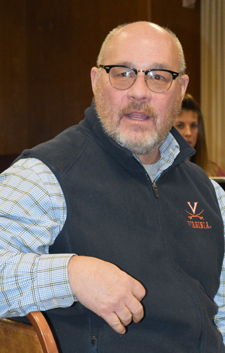
David Knepshield
Armstrong County has a terrible problem with drug and alcohol (addiction),” Knepshield summarized. “All we keep doing is sending these people back out into the community. I know no one wants this in their backyard, but we have this problem in the community. So we can keep doing what we have been doing, which isn’t working, or we can try to find a way to work it out.”
Knepshield asked if the zoning variance could stipulate that the facility would only take individuals from Armstrong County. However, Bishop felt it was too restrictive for a business model.
“Half-way houses do draw more locally, in our experience. Right now, we do not have contracts with facilities in Pittsburgh. Remember, we are talking about taking individuals that are completing in-patient treatment. There are only 10 beds available in Armstrong County. So we will have to take from Armstrong County and surrounding counties.” Bishop added that right now their Indiana half-way house has a waiting list. “The program is most successful when we have the most local people.”
“We have a real fear,” Knepshield added, “that you start bringing people up from downtown Pittsburgh, from Beaver, or Ambridge and then that element continues to live here. If we could take care of our own, wouldn’t that make a much better success rate?”
“The aim is to get as local of clients as possible,” Bishop responded. “At our Indiana facility, 99% of the clients are from Indiana County or bordering counties. I have no reason to believe it would be any different here.”
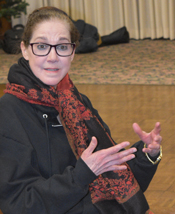
Kristen Angthr
The opinion of Resident Kristen Angthr was similar with other residents.
“I’m against this,” she said, asking members of the audience to raise their hand if they were also against it. “I don’t know why you chose Ford City. Why don’t you just expand Indiana. I don’t think Ford City is the place to open a facility like this, and certainly not in that neighborhood or in Ford City at all.”
Armstrong County Building and Loan Managing Officer Jay Smoyer said the proposed facility is similar to a previous facility that received zoning approval.
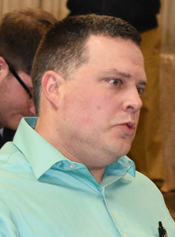
Jay Smoyer
“We acquired the property in July 2018. Bonafide legitimate offers that we have gotten to do something with place all required this style of zoning. It used to be the Mia Project, and a nursing home before that. There are plenty of bedrooms, bathrooms, kitchenettes. The ‘bones’ of the building exist already. While it is in serious disrepair, and a lot of remodeling needs to go into it, there are no commercial businesses interested in that building. Therefore, this style of institution, temporary residential housing, are the only places that have interest in this building. The building has been for sale for over two years prior to when we got it. It has not sold. Being that it was previously zoned, I don’t feel there should be much of an issue getting re-approved. We do not take this decision lightly as to who we sell it to. We have done our due diligence. Out of the potential offers, Firetree is the only company that has the experience, the knowledge, and the financial backing to operate this style of facility here in Ford City.”
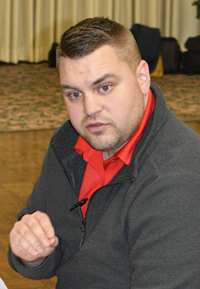
Tyson Klukan
Ford City Council Vice-President Tyson Klukan asked if residents would be permitted to attend church or have visitation with their families. Bishop responded, “There are visitations on Sundays. Church and religious practices, any kind of outside meeting or therapy would be the kind of departure from the facility that would be authorized.”
“In my opinion, I believe that it is detrimental to the neighborhood of that area. Two bars sit within 80 feet from the back property line. There is also a daycare facility within 75 feet of the Fifth Street side door,” Klukan said.
Mike Krafick is a certified recovery specialist who works for the Armstrong Indiana Clarion Drug and Alcohol Commission. However, Krafick went through the battle of addiction ten years ago and depended on a half-way house facility.
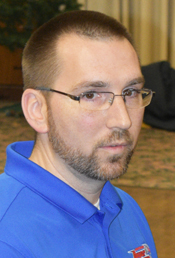
Mike Krafick
“It is because of a facility like this proposed facility as to why I am the person I am today. The fact that I had the option to go to treatment and had the support necessary available to me to become a productive member of society. I am one of those individuals that is from a surrounding county. I am originally from Westmoreland County, went to school at Kiski, moved up to Armstrong County about 12 years ago and have made a life up here with m wife and three children. My children go to the daycare facility that was mentioned that is only a few blocks away from this proposed facility. I have no concerns, fears, or objections. I wouldn’t want to pull my children from that facility because of a proposed half-way house in the neighborhood.”
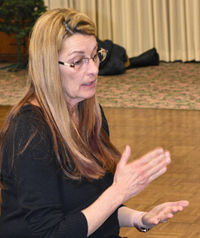
Karen Saxon
Karen Saxon who owns the Edge Bar near the proposed facility, did not share Krafick’s opinion.
“The problem is as soon as you let (addicts) come back to their home area, they fall back into their old patterns. They get back into exactly what they did with their old friends. That’s the reason we say we don’t want it here. Put it back in Indiana, make it a bigger facility. I don’t want to see this facility in the backyard of my business. My next-door neighbors don’t want to see it. There are two daycares and other businesses. This is the last thing we need right here in the middle of the town. There are better places you could put this facility outside of town, but not here where there are too many things drawing them to the wrong place.”
The Zoning Hearing Board will reconvene within 45 days to make a ruling on the facility’s request for a Special Exception.
